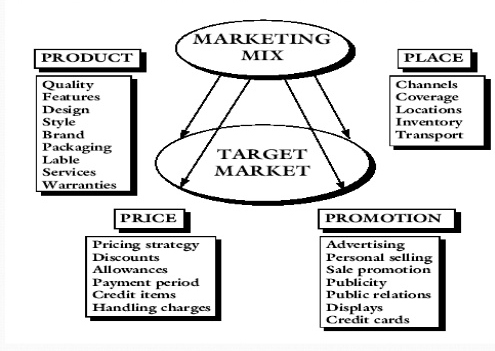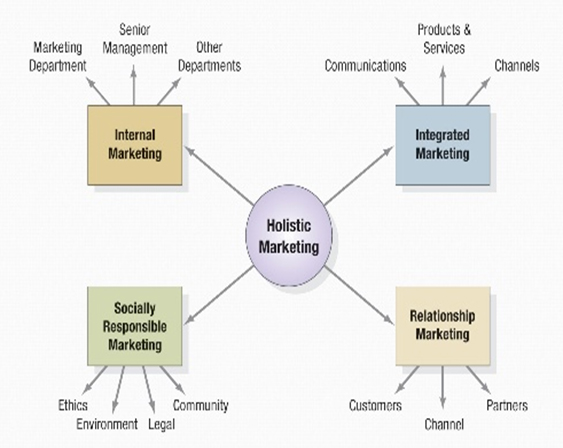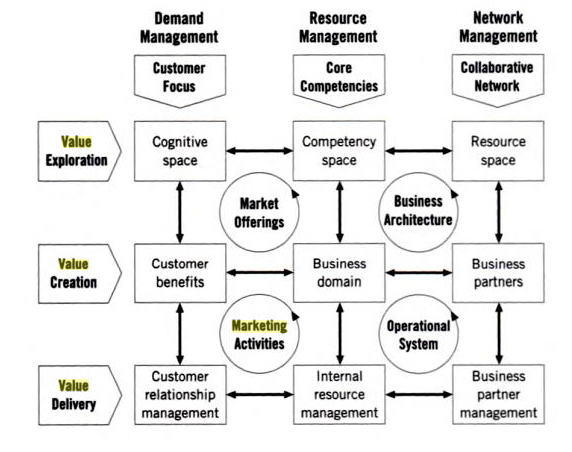Concept of Holistic Marketing (Marketing Management)
Holistic marketing is done for companies to consider the entire business. In the implementation of holistic marketing strategy, company has to analyse every aspect of the business. The company must consider interaction with consumer with its product, its website, its advertising materials, and everything else. Holistic Marketing denotes a strategy that enables organizational team to look at their marketing efforts as a 'whole', which assists to develop an overall or 'holistic marketing' policies.
The holistic marketing principle at marketing is a complicated activity and it acknowledges that every concept is significant in marketing process. Company effectively uses touch points to gain success and respect among customers such as Brand strategy and development, Image building, Logos and identity, Advertising, Newsletters, Direct mail, Web-site, Event marketing and trade shows, Word of mouth tactics and Public relations.
There are four basic elements that exemplify holistic marketing. These are relationship marketing, internal marketing, integrated marketing, and socially responsive marketing. Holistic marketing integrates the new thought with the societal marketing theory. The holistic marketing model has numerous characteristics such as the starting point is the target market. Main concentration is given to all factors related to marketing.
First major component is relationship marketing which is used to develop lifelong relations with customers. Relationship marketing highlights customer retention and satisfaction instead of a dominant focus on sales transactions. Relationship marketing was first developed from direct response marketing campaigns. In marketing a practice, relationship marketing differentiated from other types of marketing in that it identifies the long term value of customer relationships and extends communication beyond invasive advertising and sales promotional messages.
Internal marketing is used to make all members of the organization customer-oriented. Internal marketing practices occur within a company whereby the functional process supports, motivates, and authorizes employees at all management levels to deliver a good customer experience. Currently, internal marketing has been increasingly incorporated with employer branding and employer brand management, which strives to develop strong links between the employee brand experience and customer brand experience. The challenge for internal marketing is not only to get the right messages across, but to entrench them in such a way that they both change and strengthen employee behaviour.
Integrated marketing is employed to fulfil the changing requirement of consumers. Integrated marketing is an approach to brand communications where the dissimilar modes work together to generate a faultless experience for the purchaser and reinforces the brand's core message. Major objective of this marketing approach is to make all aspects of marketing communication such as advertising, sales promotion, public relations direct marketing, online communications, and social media work together as a combined force rather than allowing each to work in separation, which generate revenue and enhance economic status of company.
McCarthy developed the popular Marketing Mix, the Four Ps, that constitute the traditional marketing activities in four broad groups that include products such as Design, Features, Brand Name, Models, Style, Appearance, Quality, Warranty, Package (design, type, material, size, appearance & labelling), Service ( pre-sale, after sale, service standards, service charges), and Returns. Price such as Pricing Policies, List Price, Margins, Discounts, Rebates, Terms of Delivery, Payment Terms, Credit Terms, Instalment Purchase Facility, Resale Price, and Maintenance prices).
Place that include Channels of Distribution (channel design, types of intermediaries, location of outlets, channel remuneration, dealer-principle relation, etc.), Physical Distribution (transportation, warehousing, inventory levels, order processing, etc.)
Promotion which is personal Selling, Selling Expertise, Size of Sales Force, Quality of Sales Force, and Marketing Communications - Advertising (media-mix, media vehicles, and programmers), sales promotions, publicity & public relations, direct and interactive marketing.
These conventional concepts of Four Ps symbolize the sellers' outlook of the marketing tools available to influence buyers. In holistic marketing, marketer has to see also the buyers' standpoint, where each of these tools will deliver the customers' benefit or value.
Marketing Mix Tools
Integrated marketing is important in marketing practice because it lessens the cost of mass media and media fragmentation. As consumers spend more time online and on mobile devices, all exposures of the brand need to tie together so they are more likely to be remembered. It is observed that the tactics of brands cannot be understood by looking only at their advertising. Instead, they can be understood by considering how all aspects of their communications system work together particularly how communications are personalized for each customer and react in real time, as in a conversation.
Social responsibility is practiced to encourage consumer and societal welfare. Socially responsible marketing is marketing beliefs that denote a company should take into consideration about the best options for society in current situation and long term. Socially responsible organizations should seek to create attractive merchandise that gives instant satisfaction to consumers and long term benefits.
Performance marketing is practiced to ensure financial accountability in profit terms. Performance marketing is a marketing practice adopted by merchants and advertisers in all industries. The main benefit of this practice is that, the seller or advertiser does not incur any marketing expenses unless clear positive results. Performance marketing process is jointly favourable business model in which collaborators and affiliates encourage the merchant's products and services to escalate business to the merchant's website. In response, the merchant rewards the associate by giving back part of the revenues generated by the referred customers.
categories of Holistic marketing
Theoretical studies: Many theorists and management professionals designated that the holistic marketing is the new hypothesis for marketing in this millennium. Holistic marketing is based on holism theory, which states that the whole always has main concern, more than the total sum of individual parts. Holistic marketing needs development and execution of marketing programs, processes and measures with a wide range and correlated with each other. This marketing emphasizes that the whole is significant, an integrated marketing concept is required which is at the same time relational, integrated, omnipresent within the organization and socially responsible. This way, on the same level of importance are placed relationship marketing which develops a strategic and long term vision for the organization with all its partners, marketing in action such as integration of all components of marketing mix, implementation of marketing as business perspective in all departments of the organization and marketing responsibility towards the surrounding environment, the community where firms operate in harmony with business ethics requirements and of the law in force.Therefore holistic marketing is visualized as the development, design, and implementation of marketing programs, processes, and activities that identify the width and interdependencies involved in current marketing environment. Holistic marketing recognizes that all factors are significant in marketing and that a broad, integrated perspective is often necessary (Kotler, Jain, and Maesincee, 2002). Bulk of theorists such as Sainz (2012), Heath and Chatzidakis (2012) and Bart and Annemiek (2011) stated that this marketing theory is universal approach of marketing. Other group of theorists analyse the holistic marketing is based on the customer-centric idea (Kotler, Jain, and Maesincee, 2002) that means paying attention to the perception of the offered products and services, and implies trying to gratify customer's needs. It describes the "sense-and-respond" paradigm, which is different from the classic "make-and-sell" theory that implied selling the products that a company could make and that is not helpful anymore in the lively, competitive markets at international level.
It is mentioned in theoretical studies that to become truly holistic in marketing and achieve these changes, the marketers must develop a new set of skills, competencies in the areas of expertise such as customer Relationship management, partner Relationship management Database Marketing & Data-mining, contact Centre Marketing and Telemarketing, public Relation Marketing including Event and Sponsorship Marketing, brand-building and Brand-asset Management, Integrated Marketing Communications, profitability Analysis by Segment, Customer, Channel and experiential Marketing.
Holistic Marketing Framework
This process is a framework to create, renew and maintain customer value through interaction between pertinent marketing players such as customers, company and collaborators and value based activities such as value exploration, value creation and value delivery.
Value exploration: Value exploration means how organizations can identify new value opportunities. This requires an understanding of customer's cognitive space, existing and latent needs and dimensions such as need for participation, stability, freedom and change.
Value creation: In holistic marketing, company must develop value-creation skills to exploit a value opportunity. Marketers must make efforts to recognize the new customer benefits from the customer's perspective, use key competencies from its business field and choose and manage business collaborators from its combined networks. Marketers must recognize the thinking of customer thinks. Marketers must also monitor who the customer admires, who they interact with and who influences them.
Business change is needed to exploit core competencies. It engages three steps:
- Defining the business concept
- Determining the business scope
- Positioning the company's brand identity
Value delivery: Delivery value denotes extensive investment in infrastructure and capabilities. The company must become capable at customer relationship management, internal resources management, and business partnership management. Customer relationship management enables the company to determine who its customers are, how they behave, and what they need or want. It also facilitates the company to respond properly, logically, and promptly to different customer opportunities. To respond effectively, the company requires internal resources management to incorporate major business processes like order processing, general ledger, payroll, and production within a single family. At last, business partnership management enables the company to manage complex relationships with all its business contacts.
Holistic marketing framework.
Working of holistic marketing: Process of holistic marketing is as follows:
First, company or individual want a business profile which includes such things as what current image of company is within industry and position in customers' minds.
After that, organization needs to understand the customers to gain success.
Next, management team must have clarity in internal processes and how they impact both customers and prospects.
Once team has understood the business and their customers, they need a plan that will guide towards the vision and help to accomplish both short-and long-term goals.
To summarize, holistic marketing is a straightforward process of explaining communication of any company. It means a business needs to consider everything from the behalf of company to the homepage of their web site as well as the type of message that needs to be sent across to the clients. Holistic marketing is amalgamation of selling with honesty, using mind, intuition and experience to support business. Holistic marketing requires the company to stop and think about how existing and potential customers view its brand, identity, staff, presentation, stationery, products, packaging and support? Successful companies make sure that the overall image is faultless, to strengthen the brand and attract purchasers.

